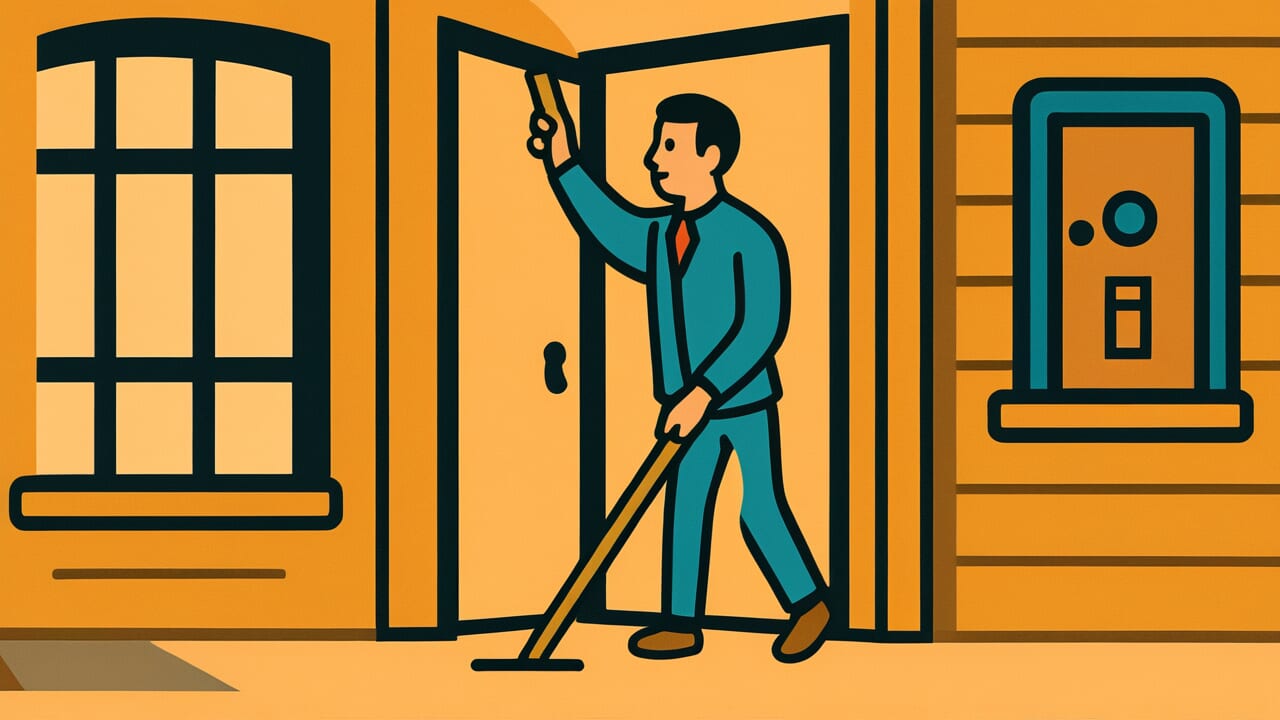How to Read “Leaning a cane at home”
Ie ni tsue tsuku
Meaning of “Leaning a cane at home”
“Leaning a cane at home” refers to the age of 50.
In ancient Chinese ritual codes, people were allowed to use a cane inside their homes once they turned 50. This custom became a way to express this particular age.
This expression appears mainly in formal writing or dignified conversations. It sounds more refined and cultured than simply saying “50 years old.”
The phrase shows respect for aging while acknowledging the reality of declining physical strength. It expresses both ideas indirectly but accurately.
People rarely use this expression in everyday conversation today. However, you might see it in classical texts or historical contexts.
The age of 50 remains a major life milestone, both now and in the past. It’s when people start noticing physical changes in their bodies.
This expression doesn’t view aging negatively. Instead, it shows an attitude of accepting aging as a natural part of life.
Origin and Etymology
This proverb comes from an ancient Chinese text called “Liji” (Book of Rites). The book describes ritual codes and social customs.
The text states: “At 50, use a cane at home; at 60, in the village; at 70, throughout the country; at 80, even at court.”
This system allowed people to use canes in progressively wider areas as they aged.
Ancient China provided social considerations based on age. Given the average lifespan back then, 50 marked the beginning of life’s later half.
People started noticing declining strength at this age. They were permitted to use canes in their homes, which were private spaces.
This wasn’t just about physical support. It was also a cultural system showing respect for elders.
We don’t know exactly when this expression reached Japan. Scholars familiar with Chinese classics likely adopted it as an elegant way to refer to age 50.
Using such indirect expressions instead of stating ages directly demonstrated refinement and education.
Interesting Facts
Ancient Chinese ritual codes expanded the areas where people could use canes as they aged.
At 50, inside the home; at 60, around the village; at 70, throughout the country; at 80, even at the imperial court.
This wasn’t just physical consideration. It was a social system ensuring elders received respect even in public settings.
In modern Japan, 50-year-olds are still very much in their working prime. But in ancient times, shorter lifespans made 50 quite elderly.
People at this age qualified for special considerations. They were seen as having lived long lives.
Usage Examples
- He reached the age of leaning a cane at home and began thinking about the second half of his life
- I have a few years left before leaning a cane at home, so I should do what I want while I still have strength
Universal Wisdom
“Leaning a cane at home” reveals a universal truth. Humans cannot resist the flow of time.
No matter how youthful or energetic someone is, their body will eventually decline. Ancient people didn’t deny this inevitable reality.
Instead, they built it into their social systems. They treated aging with respect rather than shame.
This proverb has endured because it captures complex human feelings about aging. Everyone feels anxiety or fear about losing their youth.
But aging also means accumulating experience and wisdom. Calling age 50 “leaning a cane at home” acknowledges declining physical strength.
At the same time, it accepts this as a natural life stage. The phrase shows a balanced attitude toward aging.
Everyone grows old. But how we accept that aging differs greatly across societies and cultures.
Ancient Chinese ritual codes didn’t treat aging as shameful. They positioned it as a life stage deserving respect.
This wisdom eased anxiety about aging. It helped people live the second half of life more richly. It provided emotional support for facing later years.
When AI Hears This
Using a cane inside the home shows remarkable inefficiency from a systems theory perspective.
Canes work best outdoors on uneven ground or during long-distance travel. But inside the home, floors are flat and obstacle locations are known. Travel distances are short.
This means using a cane where its effectiveness is minimal. It represents “investing resources where intervention effects are lowest” – the worst choice in system design.
Leverage point theory shows that intervention effects vary by 10 to 100 times depending on location.
Consider a company that assigns talented people only to headquarters management, not to customer-facing positions. When you apply effort in the wrong place, results drop dramatically despite equal effort.
This proverb’s essence shows a reversal phenomenon. “Conserving strength in safe places means lacking strength in dangerous places.”
If you exhaust your physical strength in the safest environment – your home – you can’t move in the outside world where you really need it.
From a whole-system view, this is a complete resource allocation failure pattern.
Lessons for Today
This proverb teaches modern people the importance of recognizing life’s milestones.
Many people today still feel young at 50. But it’s certainly when you start noticing changes in physical strength.
Don’t ignore this milestone and keep pushing yourself like you did when younger. Instead, face your body honestly and use this as a chance to reconsider how you live.
Ancient people allowed cane use from age 50 because they had wisdom. They accepted bodily changes as natural processes, not shameful conditions.
Modern society overemphasizes youth. But aging doesn’t mean decreasing value.
Rather, you can view it as life’s fulfilling period when experience and wisdom accumulate.
If you’re approaching 50, accept this positively as a new stage beginning.
It’s time to shift from living by physical strength to living through wisdom and experience.
Listen to your body’s voice and enjoy life at a comfortable pace. That’s the deep wisdom this proverb conveys.



Comments